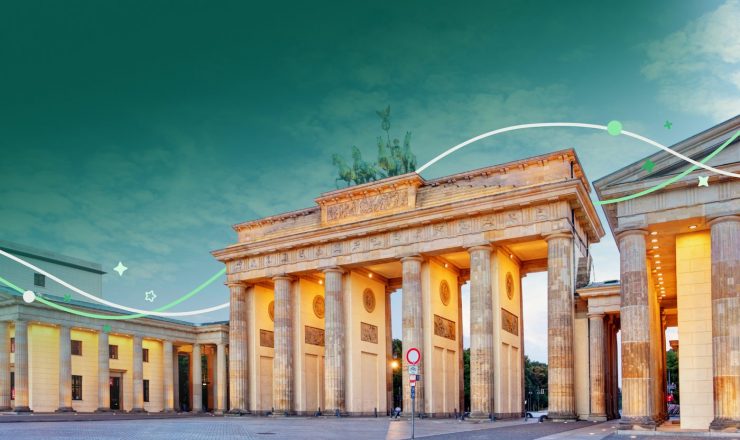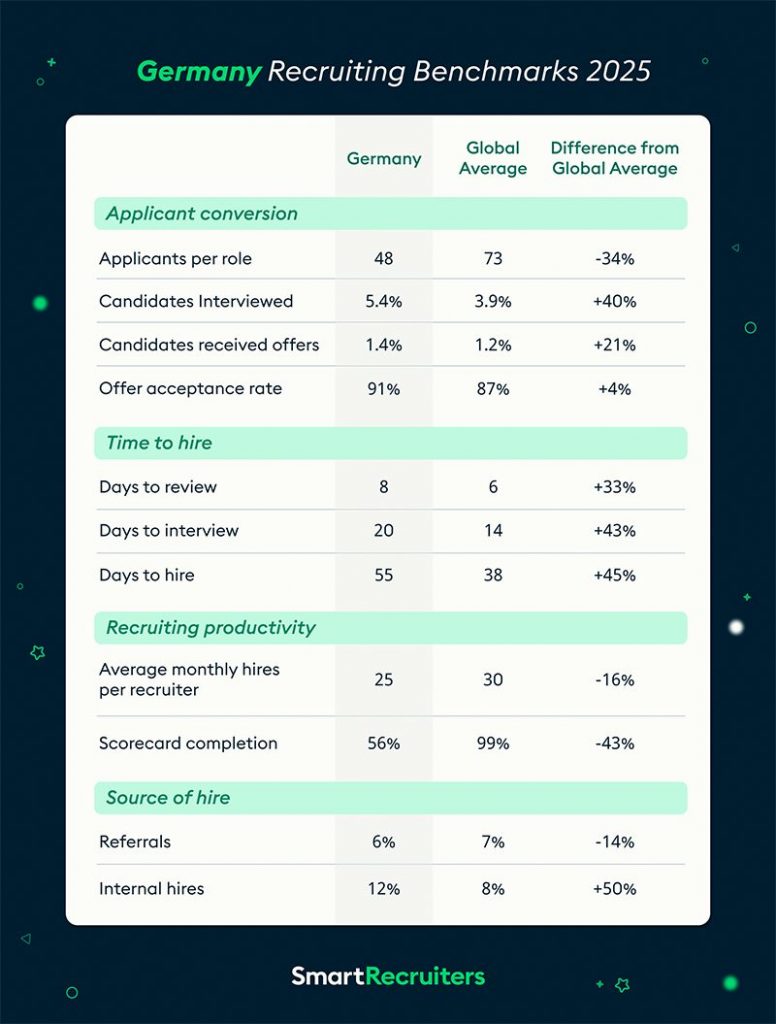Decreasing inflation and modest growth in the German economy in early 2025 have been tempered by pressures on international trade. Amidst the evolving geopolitical situation, technology advancements offer German hiring teams the opportunity to streamline hiring with more efficient practices. Benchmark recruiting metrics can help German organizations across all industries see where they fit into the bigger picture and chart a course for improvement.
Recruiting Benchmarks Report
For its landmark Recruiting Benchmarks 2025 Report, SmartRecruiters examined nearly 90 million applications for 1.5 million jobs across 95 countries. This blog post dives into data from 5 million job applications in Germany.
“Our Benchmarks data is a great opportunity for companies to look at their own processes and get a better understanding of how they compare,” said Dennis Böcker, Vice President, EMEA Central, SmartRecruiters. “Then they can dive deeper and determine where they’re ahead and where they need to make new investments – in their people, processes, or technology.”
Here are the top takeaways.
Applicant conversion
- Employers in Germany receive an average of 48 applications per role, 34% lower than the global average, and the lowest application volume of countries analyzed for the report.
- The smaller-than-average applicant volume means that more candidates get interviewed and proceed to the offer stage. From the candidate’s perspective, this means that finding a job is easier in Germany than in other countries.
- The job offer acceptance rate in Germany is 4% higher than average, suggesting that the extra scrutiny in the long process (explained below) by hiring teams makes German candidates less prone to reject offers.
Time to hire
- The median time to hire in Germany is 55 days, 45% above the global average. German companies take longer to review, interview, and hire candidates than their global counterparts.
- Hiring in Germany often entails the involvement of the Betriebsrat, or Worker’s Council, which partially explains the longer hiring times, particularly between the interview and offer stages. In Germany, there are 35 days on average between the interview and hire, compared to 24 days in other countries.
- The time to hire for organizations using AI is typically 26% faster than those that don’t use it. By applying AI to their hiring process, German organizations could not only fill positions faster but also help their recruiters achieve more hires per month.
Recruiting productivity in Germany
- Recruiters in Germany make an average of 25 hires per month, 18% lower than their global counterparts, who make an average of 30 hires per month.
- Scorecard adoption in German is low among teams that use scorecards, with only 56% of hiring teams completing them. This could potentially be due to more people being involved in the hiring process because of Betriebsrat.
Sources of hire in Germany
- Employers in Germany exceed in internal mobility, generating 50% more hires from internal sources than those in other countries. Employers not meeting this threshold should seek ways to support the career growth of current employees.
- German companies rank on par with the global average for referral-based hiring. To make up for lower-than-average applicant volume, German employers could invest in improving their employee referral programs.
Recruiting metrics implications for Germany
Industry-related data from the Benchmarks Report shows that there is no one right way to hire: one company’s short time to hire (e.g., a retailer) may be impossible for another company (e.g., a technology firm). As the economic headwinds shift seemingly every moment, German employers need AI-driven technology that supports agility regardless of external conditions.
Recruiting teams have the opportunity to further develop their creativity, relationship-building, and strategic thinking skills as they hand off rote tasks like candidate screening and interview scheduling to AI-driven technology. With technology’s help, German hiring teams are poised to chart a new course for the nation’s economy in a changing world.
German recruiting case study
Rewe International AG, a leading retail and tourism group in Europe, needed to replace an outdated, maintenance-heavy in-house system and streamline a lengthy, fragmented recruiting process to support its workforce growth. With SmartRecruiters, the company implemented a modern, end-to-end recruitment platform, optimizing its hiring strategy and improving collaboration across teams. The results: a 48% reduction in time to hire, a 92% approval rating from hiring managers, and a more efficient, scalable recruitment process. Read the case study
Get more recruiting benchmark metrics
Download the full report to get a global overview of hiring benchmarks plus insights on industry-related differences in hiring across healthcare, retail, hospitality, manufacturing, and technology.







